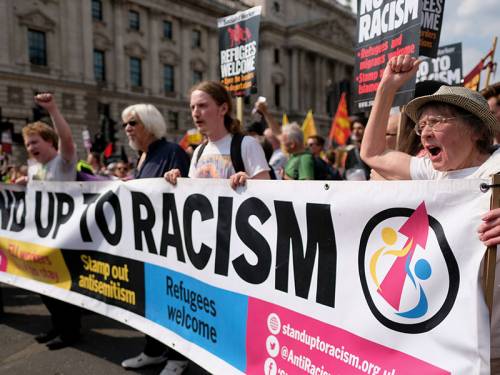Differences should enrich, not enrage us
By Vernon S. Broyles III | Presbyterians Today
The Lord said to Joshua, “This day I will begin to exalt you in the sight of all Israel, so that they will know that I will be with you as I was with Moses.” . . . Joshua said, “By this you shall know that among you is the living God who without fail will drive out from before you the Canaanites, Hittites, Hivites, Perizzites, Girgashites, Amorites and Jebusites.” — Joshua 3:7, 10
 Wow! And what about the Philistines? And are there others who need to be subdued? Tongue-twisting passages like these are the bane of lay readers and a source of fascination for many who heard these wondrous lists of names read on a Sunday morning. They are, of course, a rendering of the ethnic diversity of the world the Hebrews marched into under Joshua and are a “list of enemies” who stood between the children of Israel and the Promised Land.
Wow! And what about the Philistines? And are there others who need to be subdued? Tongue-twisting passages like these are the bane of lay readers and a source of fascination for many who heard these wondrous lists of names read on a Sunday morning. They are, of course, a rendering of the ethnic diversity of the world the Hebrews marched into under Joshua and are a “list of enemies” who stood between the children of Israel and the Promised Land.
But the story is much longer. In the person of Jesus, it becomes a challenge to those who dare claim that they are “the chosen,” whose future is guaranteed: “Jesus went through one town and village after another, teaching as he made his way to Jerusalem. Someone asked him, ‘Lord, will only a few be saved?’ He said to them, ‘Strive to enter through the narrow door; for many, I tell you, will try to enter and will not be able. . . . There will be weeping and gnashing of teeth when you see Abraham, Isaac and Jacob and all the prophets in the kingdom of God and you yourselves thrown out. Then people will come from east and west, from north and south, and eat in the kingdom of God.’” (Luke 13:22–30).
We are not Canaanites, Hittites or Jebusites, but all of us humans are part of the incredible mix of races, tribes and ethnicities created by God. And the truth is that we have defaced the work done by our Creator by choosing sides based on our perceived tribal identities, ignoring the fact that few, if any of us, can claim any absolute tribal or ethnic purity.
Most of us who have dared to research our lineage through Ancestry.com or some other channel have discovered surprises. Some have even come to the point of deciding that when they check the box on forms indicating their ethnicity, they will now check “Other.”
We must approach our racial and ethnic identity with great care, remembering that we have too often used that sense of identity to lord it over others whom we deem less worthy. It is called “racism.” It was used to justify slavery in the United States, and it is still at work in every nation. Author Ta-Nehisi Coates framed the issue in the plainest of language when he wrote, “Race is the child of racism, not the father.”
Wherever racism exists, it is about power. It employs manufactured racial categories that determine who will be privileged, who will be ignored or neglected and who will be oppressed. As Christians who claim the universal love of God in Jesus Christ, let us actively claim the promises of a new heaven and new earth, in which tribal, ethnic and racial differences provide occasions for growth and enrichment, rather than instruments of conflict and oppression.
Vernon S. Broyles III is a volunteer for public witness in the PC(USA)’s Office of the General Assembly.
Support Presbyterian Today’s publishing ministry. Click to give
![]() You may freely reuse and distribute this article in its entirety for non-commercial purposes in any medium. Please include author attribution, photography credits, and a link to the original article. This work is licensed under a Creative Commons Attribution-NonCommercial-NoDeratives 4.0 International License.
You may freely reuse and distribute this article in its entirety for non-commercial purposes in any medium. Please include author attribution, photography credits, and a link to the original article. This work is licensed under a Creative Commons Attribution-NonCommercial-NoDeratives 4.0 International License.
Categories: Presbyterians Today, Racial Justice
Tags: antiracism, ethnic diversity, joshua 3, racial diversity, racism
Ministries: Presbyterians Today, Racial Equity & Women’s Intercultural Ministries